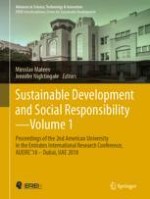2020 | OriginalPaper | Buchkapitel
Occupants’ Behavior and Energy Usage in Emirati’s Individual Houses in Al Ain: Exploratory Investigation
verfasst von : Amna Al Ameri, Kheira Tabet Aoul
Erschienen in: Sustainable Development and Social Responsibility—Volume 1
Aktivieren Sie unsere intelligente Suche, um passende Fachinhalte oder Patente zu finden.
Wählen Sie Textabschnitte aus um mit Künstlicher Intelligenz passenden Patente zu finden. powered by
Markieren Sie Textabschnitte, um KI-gestützt weitere passende Inhalte zu finden. powered by
